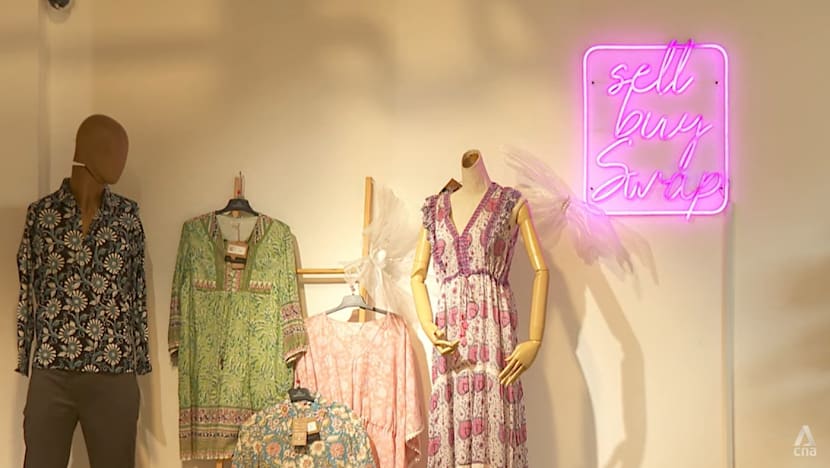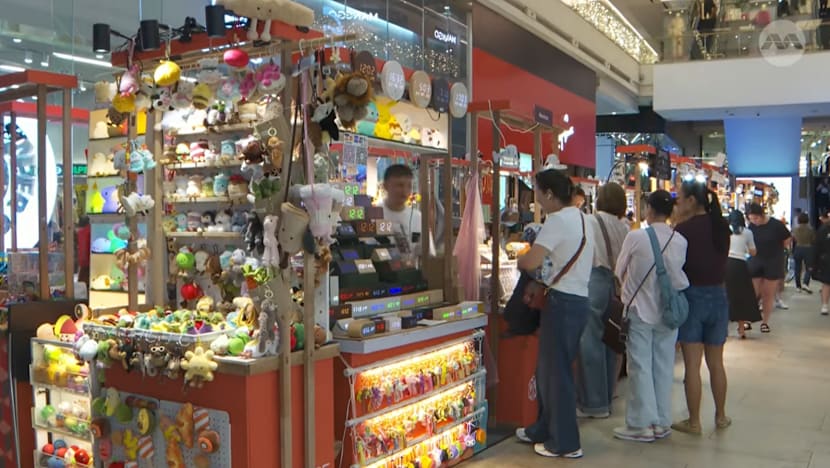More retailers in Singapore turning to short-term leases to manage costs, stay flexible
Retailers are moving away from the typical three- to five-year contracts, with landlords growing more receptive to flexible arrangements.

Sustainable fashion firm Swapaholic's shopfront in Clarke Quay.

This audio is generated by an AI tool.
SINGAPORE: One in five retailers in Singapore are now opting for short-term leases of less than a year and flexible store formats, according to the Singapore Retailers Association (SRA).
This figure is about 10 per cent more than last year, as more retailers avoid the typical three- to five-year contracts in order to stay nimble and manage costs, the association told ┬ķČ╣.
Landlords are also increasingly open to such flexible structures, with some even reserving units to host pop-ups year-round.
The trend reflects growing caution and adaptability in the sector as businesses navigate shifting consumer habits and cost pressures, said analysts.
TESTING THE WATERS
Sustainable fashion firm Swapaholic is one such retailer experimenting with short-term rentals.
Once an entirely online business, it opened a physical outlet in CQ @ Clarke Quay mall on a nine-month lease. It allows customers to swap, sell and buy preloved clothing.
ŌĆ£The short-term lease allows us to experiment. It allows us to see how a concept like ours fits in with this mainstream retail environment, measure impact, gather insights, and then commit to the long term,ŌĆØ said the companyŌĆÖs founder Priyanka Shahra.
This willingness to test physical retail spaces before making long-term commitments reflects a broader shift, said SRA council member Jason Lee.
He noted that retailers must be mindful of obligations that come with fixed-term leases, and may struggle if they encounter cash flow issues or have insufficient manpower to manage their stores.
However, analysts said shorter leases often come with higher costs.
Mr Ethan Hsu, head of retail at Knight Frank Singapore, said these flexible arrangements typically command rents that are higher than traditional long-term agreements.
ŌĆ£For shorter leases, they tend to command higher rents on a square foot basis, compared to a standard three- or five-year lease term,ŌĆØ Mr Hsu added.
ŌĆ£The reason for this is quite simple. Shorter tenures carry a higher vacancy and turnover risk for the landlords, so that flexibility is actually priced into the rent.ŌĆØ

Even so, more landlords are embracing this model.
At CQ @ Clarke Quay mall, for instance, certain units are now designated for pop-up concepts, alongside niche ventures like a dog grooming and swimming gym.
Ms Evelyn Soh, general manager of CQ @ Clarke Quay and Funan, said the approach helps keep the retail environment vibrant and diverse.
ŌĆ£The successful ones, we intend to retain and to continue growing them ŌĆ” itŌĆÖs also feasible for us to set aside one or two units that can have certain constant pop-ups which will always be new and exciting to our shoppers,ŌĆØ she said.
ŌĆ£These are ways we can look at how we are attracting the day crowd as well, and it becomes a day-to-night and all-day kind of environment that is suitable for everyone.ŌĆØ
REITS MAY NOT HAVE RISK APPETITE
But analysts said real estate investment trusts (REITS), which own many shopping malls in Singapore, are generally more cautious about adopting flexible leasing models.
REITS are investor groups who pool together funds to own and run properties, with the goal of ensuring stable incomes and long-term growth.
This year, major REITs have reported positive rental reversions - meaning leases are renewed at higher rates than before.
For example, property manager LendleaseŌĆÖs retail portfolio achieved a positive rental reversion of 8.9 per cent as of Sep 30 this year.
ŌĆ£For the REITs, because they do have certain internal benchmarks that they have set ŌĆ” they like stability, so a majority of their leases will still be based on a permanent lease structure,ŌĆØ said Mr Hsu.
ŌĆ£But they will also be able to weigh what percentage of their leases can operate on a more flexible structure, so that they can also use that to rejuvenate the kind of tenant mix that they want to have within the mall,ŌĆØ he added.
Lendlease - the developer behind several malls like 313@somerset and Jem - said finding that balance between stability and novelty is an ongoing process.
LendleaseŌĆÖs retail and workspace management head Jenny Khoo said if the company has plans to enhance offerings at its malls, it could ask tenants to contribute.
ŌĆ£We may approach the tenants to ask, ŌĆśWould you consider to scale up, scale down, or ŌĆ” bring in additional offerings from international or even homegrown brands?ŌĆÖ They may have some other brands that they are in the midst of curating that could (coincide) with our planning,ŌĆØ she added.
ŌĆ£(For) permanent retail space, we will see what are the shoppersŌĆÖ needs and wants within the communities before we have put in any of the offerings.ŌĆØ












